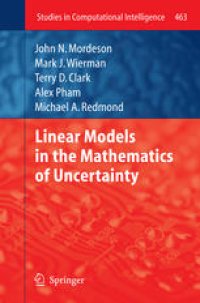
Ebook: Linear Models in the Mathematics of Uncertainty
- Tags: Computational Intelligence
- Series: Studies in Computational Intelligence 463
- Year: 2013
- Publisher: Springer-Verlag Berlin Heidelberg
- Edition: 1
- Language: English
- pdf
The purpose of this book is to present new mathematical techniques for modeling global issues. These mathematical techniques are used to determine linear equations between a dependent variable and one or more independent variables in cases where standard techniques such as linear regression are not suitable.
In this book, we examine cases where the number of data points is
small (effects of nuclear warfare), where the experiment is not repeatable (the breakup of the former Soviet Union), and where the data is derived from expert opinion (how conservative is a political party). In all these cases the data is difficult to measure and an assumption of randomness and/or statistical validity is questionable.
We apply our methods to real world issues in international relations such as nuclear deterrence, smart power, and cooperative threat reduction. We next apply our methods to issues in comparative politics such as successful democratization, quality of life, economic freedom, political stability, and failed states. Finally, issues involving deaf and hard of hearing children are explored.
The purpose of this book is to present new mathematical techniques for modeling global issues. These mathematical techniques are used to determine linear equations between a dependent variable and one or more independent variables in cases where standard techniques such as linear regression are not suitable.
In this book, we examine cases where the number of data points is
small (effects of nuclear warfare), where the experiment is not repeatable (the breakup of the former Soviet Union), and where the data is derived from expert opinion (how conservative is a political party). In all these cases the data is difficult to measure and an assumption of randomness and/or statistical validity is questionable.
We apply our methods to real world issues in international relations such as nuclear deterrence, smart power, and cooperative threat reduction. We next apply our methods to issues in comparative politics such as successful democratization, quality of life, economic freedom, political stability, and failed states. Finally, issues involving deaf and hard of hearing children are explored.
The purpose of this book is to present new mathematical techniques for modeling global issues. These mathematical techniques are used to determine linear equations between a dependent variable and one or more independent variables in cases where standard techniques such as linear regression are not suitable.
In this book, we examine cases where the number of data points is
small (effects of nuclear warfare), where the experiment is not repeatable (the breakup of the former Soviet Union), and where the data is derived from expert opinion (how conservative is a political party). In all these cases the data is difficult to measure and an assumption of randomness and/or statistical validity is questionable.
We apply our methods to real world issues in international relations such as nuclear deterrence, smart power, and cooperative threat reduction. We next apply our methods to issues in comparative politics such as successful democratization, quality of life, economic freedom, political stability, and failed states. Finally, issues involving deaf and hard of hearing children are explored.
Content:
Front Matter....Pages 1-22
Front Matter....Pages 1-1
Fuzzy Set Theory....Pages 3-40
Evidence Theory....Pages 41-55
Front Matter....Pages 57-59
Issues in International Relations....Pages 61-72
Issues in Comparative Politics....Pages 73-84
Issues of Hearing Impairment....Pages 85-90
Front Matter....Pages 91-91
The Analytic Hierarchy Process....Pages 93-117
The Guiasu Method....Pages 119-143
Jeffrey’s Rule....Pages 145-153
Yen’s Method....Pages 155-162
Methods Based on Fuzzy Set Theory....Pages 163-175
Set–Valued Statistical Methods....Pages 177-185
Intuitionistic Fuzzy Sets and Political Stability....Pages 187-200
Front Matter....Pages 201-201
Quality of Life....Pages 203-207
Failed States....Pages 209-219
Additional Results....Pages 221-237
Back Matter....Pages 239-263
The purpose of this book is to present new mathematical techniques for modeling global issues. These mathematical techniques are used to determine linear equations between a dependent variable and one or more independent variables in cases where standard techniques such as linear regression are not suitable.
In this book, we examine cases where the number of data points is
small (effects of nuclear warfare), where the experiment is not repeatable (the breakup of the former Soviet Union), and where the data is derived from expert opinion (how conservative is a political party). In all these cases the data is difficult to measure and an assumption of randomness and/or statistical validity is questionable.
We apply our methods to real world issues in international relations such as nuclear deterrence, smart power, and cooperative threat reduction. We next apply our methods to issues in comparative politics such as successful democratization, quality of life, economic freedom, political stability, and failed states. Finally, issues involving deaf and hard of hearing children are explored.
Content:
Front Matter....Pages 1-22
Front Matter....Pages 1-1
Fuzzy Set Theory....Pages 3-40
Evidence Theory....Pages 41-55
Front Matter....Pages 57-59
Issues in International Relations....Pages 61-72
Issues in Comparative Politics....Pages 73-84
Issues of Hearing Impairment....Pages 85-90
Front Matter....Pages 91-91
The Analytic Hierarchy Process....Pages 93-117
The Guiasu Method....Pages 119-143
Jeffrey’s Rule....Pages 145-153
Yen’s Method....Pages 155-162
Methods Based on Fuzzy Set Theory....Pages 163-175
Set–Valued Statistical Methods....Pages 177-185
Intuitionistic Fuzzy Sets and Political Stability....Pages 187-200
Front Matter....Pages 201-201
Quality of Life....Pages 203-207
Failed States....Pages 209-219
Additional Results....Pages 221-237
Back Matter....Pages 239-263
....